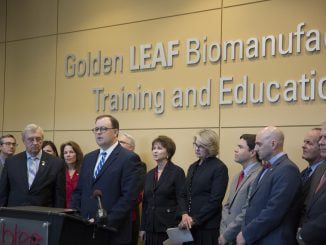
In 2016, North Carolina legislators created the NC Promise Tuition Plan to help students who struggle to afford college—as well as bolster enrollment at several UNC campuses. The $51 million plan reduces in-state tuition for undergraduates at participating UNC System schools to just $500 per semester and out-of-state tuition to $2,500 per semester.
The plan launched at three universities last fall: Western Carolina, UNC-Pembroke, and Elizabeth City State. The universities in the program are all in economically struggling rural areas. They are also all close to the North Carolina border.
By at least one metric, the program is already a success. It helped all three schools to significantly increase enrollment. First-year enrollment increased at UNCP and ECSU by 20 percent. At WCU, it increased by more than 10 percent. And undergraduate transfer rates increased by even more: 57 percent at ECSU, 56 percent at UNCP, and 40 percent at WCU. No other school in the system experienced more than 3 percent enrollment growth.
Legislators originally allocated $40 million to NC Promise from the state’s general fund. But when enrollment grew, another $11 million had to be added. The program’s biggest beneficiaries are out-of-state students, mostly from Virginia, Tennessee, and South Carolina. They stand to save more than $10,000 per year in tuition costs.
Given that large expenditure, it’s important to ask: should North Carolinians be subsidizing the education of out-of-state students?
This is not the first time the topic has been debated. Since the mid 1980s, North Carolina has mandated that at least 82 percent of first-year students be North Carolina residents, i.e. an 18 percent cap on nonresident freshmen. Policymakers believed that North Carolina universities should be, first and foremost, reserved for North Carolina students.
But now, at least one NC Promise school has exceeded the cap; 28.5 percent of Elizabeth City State’s 2018 freshman class came from outside North Carolina. And in March, ECSU requested that the UNC Board of Governors raise its out-of-state non-resident cap to 30 percent for the next two years. The BOG declined to increase the cap. Instead, it agreed not to fine ECSU if it exceeds the 18 percent cap in 2019 and 2020.
John Newsom reported in the Greenboro News & Record that several Board of Governors members think the time is right to reevaluate the out-of-state cap. BOG member Lou Bissette said at a recent board meeting, “A lot of our institutions have changed. A lot of their needs have changed. We’re in more competitive situations with some out-of-state universities. We might not end up doing a thing, but I think it’s something I’d like to see this board take a look at.”
Other members have voiced their support for the cap. BOG member Steve Long argued in a 2016 board meeting that the policy has an important purpose. “Parents are concerned about the accessibility of NC State, Carolina, East Carolina, all of our schools. There is a policy reason for having the 18 percent cap,” said Long.
But changing the cap and asking North Carolinians to pay for it are two different issues. UNC-Chapel Hill often comes close to the 18 percent cap—or, as in 2011, 2012, and 2016—violates it. But at Carolina, out-of-state students pay their own way, for the most part. UNC-Chapel Hill’s nonresident undergraduate tuition for the coming school year is $35,929.
The North Carolina General Assembly has a long history of generously funding the UNC System. Last year, state appropriations made up 41 percent of the system’s total operational budget. The NCGA provides much more funding than other states; North Carolina ranks sixth nationally in per-student operating expenditures for public 4-year institutions.
Providing struggling students access to higher education is a worthy goal. But North Carolina taxpayer money should be reserved for North Carolina students. UNC institutions can continue to provide access: by closely monitoring spending and keeping in-state tuition low across the board.
Jenna A. Robinson, Ph.D., is President of The James G. Martin Center for Academic Renewal




